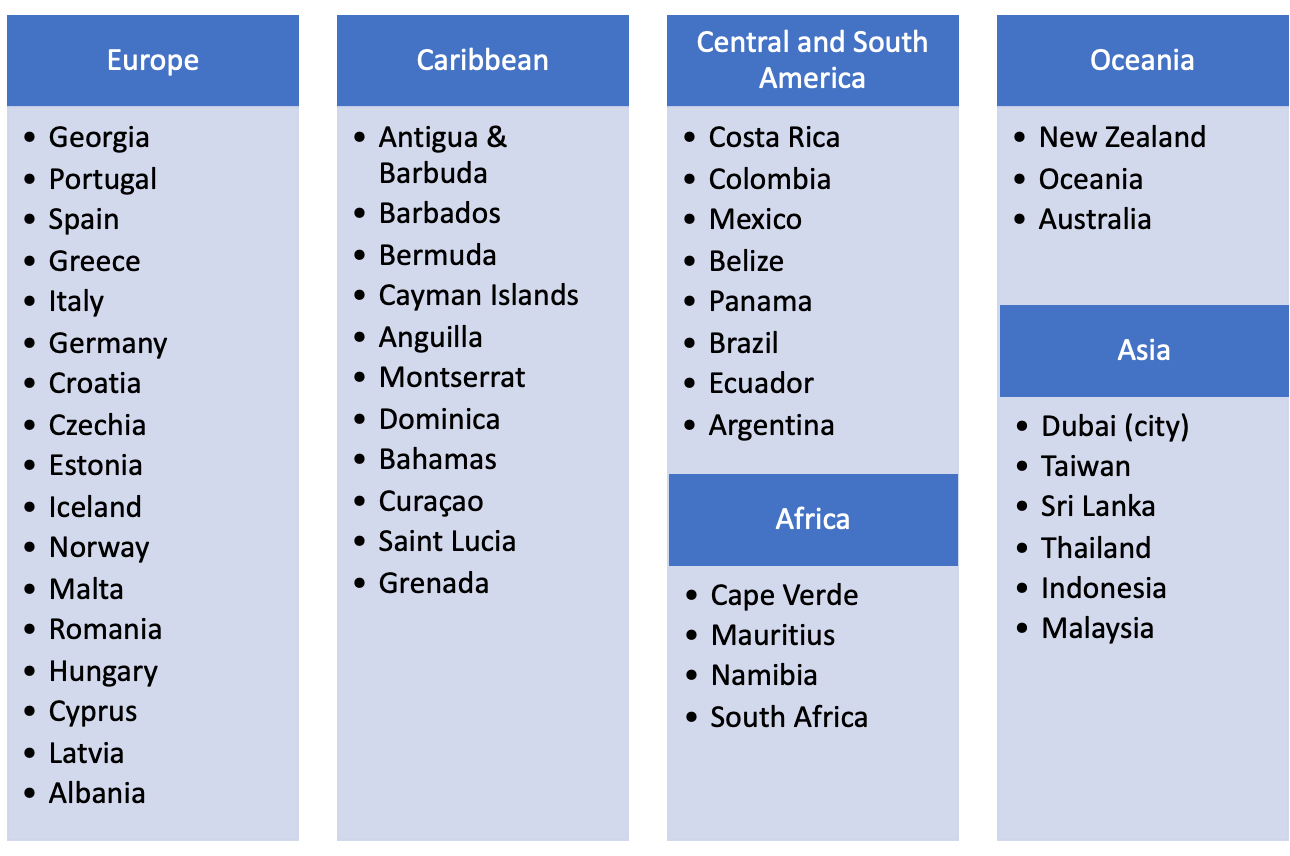There have always been digital nomads but since the increase in remote work options sparked by the COVID-19 pandemic, more people from all over the world are choosing the nomad lifestyle. Governments are responding to this shift in work patterns by creating new digital nomad visas or expanding existing work authorization programs. Spain recently joined a long list of countries that have launched digital nomad visa programs since 2020.
People choose to be nomadic for a variety of reasons – to see the world, meet new people, experience different ways of life. It’s an ideal lifestyle for recent college graduates who want to travel while they are young and still continue to build their career. For international students, digital nomad visas provide a way to work for a U.S. company while living in another country, so you can avoid the complicated U.S. immigration system. Also, you will not have to rely on one employer for your immigration status.
No matter what attracts you to remote work, this article provides you with all the information you need on how to become a digital nomad and different visa options around the world.
Interstride Tip
Consider a digital nomad visa if you’re an international student working in the U.S. and you didn’t win the H-1B visa lottery to remain in the country.
What Is a Digital Nomad?
Digital nomads are people who work remotely using a laptop or tablet. They may be employed by a company but only meet with co-workers online, or they may be freelancers who are self-employed. They generally travel to different countries or regions while continuing to work remotely. A digital nomad may live in Costa Rica for two years and then in Greece for two years.
Being a digital nomad provides the ultimate level of freedom. You are not stuck inside all day, tied down to an office. You can work at the beach, in a park, in a library, or even at a bar. Many digital nomads also make their own hours, and as freelancers, they often have the ability to turn down work that doesn’t interest them.
It’s easy to see why more people are choosing the digital nomad lifestyle, and as it grows in popularity, so do the terms we use to talk about it. Digital nomads are often referred to as:
- Global nomads
- Remote workers
- Adventure travelers
- Techpats
What Is a Digital Nomad Visa?
A digital nomad visa, sometimes referred to as a freelance visa, provides a pathway for remote workers to live and work in another country for a limited amount of time. The validity period of a digital nomad visa lasts varies by country but it’s typically 1-2 years. These visas are meant to be temporary and usually do not offer a path to permanent residency. However, in some countries such as Italy, Greece, Czech Republic, and Portugal, you may apply for permanent residency while on a digital nomad visa. For more details about the specific visa options in various countries, see the country list section below.
What Does a Digital Nomad Visa Allow You to Do?
Digital nomad visas allow you to work remotely part-time or full-time. You can be self-employed, work as a freelancer, or be employed by a company, but the company(s) you work for cannot be located in the country issuing the remote work visa. Generally, there is no minimum or maximum amount of hours you can work, but there is usually a minimum amount of income you must make each month.
Some countries such as Bermuda also allow students who are studying 100% remotely through an institution in their home country to apply for a digital nomad visa. However, this option is more rare to find as digital nomad visas are generally for work, not school. Lastly, nomad digital visas allow you to travel around the visa-issuing country after you arrive. In some cases, you need to have a physical address such as a rented apartment but can still travel around within the country.
Interstride Tip
If you want to travel back to your home country for a holiday or vacation in a different country, do your research before leaving to ensure your return to the country will be smooth. For digital nomad visas in EU countries, you can travel freely to other EU countries but may not be able to leave the EU and return without getting a new visa.
Can I Include My Family on a Digital Nomad Visa?
Many countries allow you to bring immediate family with you while traveling on a digital nomad visa. Immediate family members are children under the age of 21 and spouses. Children may be able to go to school in the country you travel to and spouses may be able to work, but this varies by country. You will likely have to pay an additional fee for each family member on the visa. For example, in Anguilla, the digital nomad visa for an individual is $2,000, but for a family of up to four people, the fee is $3,000.
Who Is Eligible for a Digital Nomad Visa?
There are dozens of countries that offer digital nomad visas, and each has its own specific requirements. However, there are a few universal eligibility requirements:
- Must be at least 18 years old
- Must work remotely using technology such as a laptop or tablet
- Have a valid passport or other equivalent government-issued ID
In most cases, all income must be earned from remote work with businesses based outside of the country issuing the visa. In some countries, part-time local employment may be allowed as long as the majority of income comes from remote work. For example, to qualify for a Spain freelance visa, at least 80% of your income must come from non-Spanish companies operating outside of Spain whether you are self-employed or a remote employee.
Most digital nomad visas have a minimum monthly or yearly income requirement to maintain visa status. The average minimum monthly income requirement is between $2,000 and $3,500. Some countries allow investment in local businesses or deposits in local bank accounts in place of the minimum income requirement. This may be a good option for entrepreneurs.
Low Income Nomad Visa Options
| Country: | Income requirement: | Visa fee: |
| Bermuda | None | $263 |
| Curaçao | None | $300 |
| Saint Lucia | None | $75 |
| Portugal (D7 visa) | 600 euros per month | €155 |
| Ecuador | $1,275 per month | $450 |
| Cape Verde | 1500 euros per month | €54 per month |
| Brazil | $1,500 per month | $100 |
Other Common Eligibility Requirements
Some countries have a minimum education requirement such as a bachelor’s or master’s degree to apply for a digital nomad visa. Other common requirements include health insurance, a lack of criminal record, and a place to live in the visa-issuing country. Lastly, in some cases, you must have worked remotely already for a certain period of time. In Latvia, it’s at least six months, while in Spain, you must have worked remotely for the same company for at least three months.
What Type of Work Can You Do Under a Digital Nomad Visa?
Many types of work can be done using a digital nomad visa as long as it can be done remotely over the internet. However, some companies that hire remote workers require them to reside within a certain country or area. If you are interested in becoming a digital nomad, make sure to check the terms for remote work at your company. Many digital nomads choose contract or freelance work because there are often no geographical restrictions.
Common digital nomad jobs include:
- Software developer
- Programmer
- Online teacher
- Content creator
- Writer
- Customer service representative
- Consultant
- Digital marketer
Which Countries Offer Digital Nomad Visas?
Unfortunately, the U.S. does not currently offer a visa for digital nomads, nor does Canada. However, there are over 45 countries that do have some sort of remote worker visa option. This could be a once-in-a-lifetime opportunity for you to experience a new culture. Different countries have different names for their remote worker visa options. Barbados offers a Welcome Stamp Visa while Hungary offers a White Card. Below is a full list of the countries that offer some type of digital nomad visa:

Source: https://nomadgirl.co/countries-with-digital-nomad-visas/
Other countries such as Indonesia have announced that they are developing a digital nomad visa program that will be available in future years. If the demand for remote work continues, we can expect more countries to offer these types of visas.
How to Apply for a Digital Nomad Visa
To apply for a digital nomad visa, you will need to complete an application form. For some countries, this form can be completed online. For others, you will need to take your completed form to an embassy. Then, you will pay a visa fee which can range from $75 to several thousand dollars depending on the country issuing the visa. A few countries such as Georgia and Mauritius do not charge a fee in order to attract more remote workers and entrepreneurs.
You will likely have to complete an interview at an embassy or consulate and submit paperwork that shows you meet the eligibility requirements for the visa. Required documents usually include:
- Passport
- Additional identification pictures
- Proof of income from remote work
- Higher education degree
Interstride Tip
If your passport is going to expire within the next six months, make sure to renew it before you apply for your digital nomad visa or your application may be denied! For international students currently studying in the U.S., you may have to return to your home country to renew your passport.
How Long the Process Takes
Processing times for digital nomad visas vary by country. Give yourself several weeks to collect all the required documentation, and apply several months in advance to ensure that your visa is ready when you need it. Digital nomad visa processing times range from two weeks to four months.
Tax Implications of Being a Global Nomad
Being a digital nomad makes taxes more complicated. Your country of citizenship may require you to pay taxes on any remote work you make even while out of the country. You may also have to pay taxes in the country you are residing in which means some digital nomads have to pay double taxes. Thankfully, there is often a grace period of six months before you must start paying taxes in the country of your visa.
If you are self-employed or work as a freelancer, you may have to make multiple tax payments each year. However, tax laws and regulations vary greatly from country to country, and this information is a general guide only. Contact a professional tax advisor for any legal or tax advice.
What to Do When Denied a Digital Nomad Visa
Was your request for a digital nomad visa denied? Here are some possible reasons for denial:
- Incomplete or incorrect application form
- Failed to show that you work remotely
- Failed to show you can meet the minimum income requirement
- Failed to prove that you can find a place to live and support yourself while in the country
- Failed to meet other requirements such as an advanced degree or health insurance
- Failed criminal background check
If you are unable to secure a digital nomad visa, there are other options. Tourist visas are common and easy-to-acquire visas in many countries. However, it is not actually legal to work remotely on a tourist visa. Instead, you will need to apply for a different type of visa that grants work authorization. Some countries have special visas for entrepreneurs and investors. Alternatively, you could gain work authorization through a student visa with an internship or research fellowship.
Conclusion
Being a digital nomad is not all beaches and pubs. It can be difficult to navigate the immigration system in a new country every year or two. Doing your research in advance can help you make the best choices of which countries to travel to. You may choose a country like Georgia which offers no-fee visas or a country like Costa Rica where you can easily apply online. When applying for your digital nomad visa, consider having a legal professional review your application and documents to give you the highest chances of approval.
























